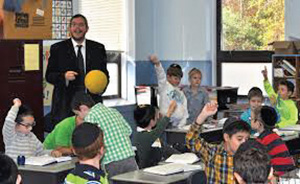

School safety is of paramount concern for every community. Each school has the responsibility to protect students and teachers from the type of lethal craziness that currently exists due to the widespread and gratuitous availability of handguns and assault weapons. Schools deal with this reality in different ways. ID badges for school personnel, lockdown drills and procedures, buzzer or swipecard entry, armed or unarmed guards, multiple cameras, perimeter fences, panic buttons and intercoms are some of the security measures in place.
Education Secretary Betsy DeVos and others in the current administration have proposed that teachers be armed to be the first line of defense in case of an active shooter. Perhaps in certain very rural areas where hunting and guns are part of the community lifestyle this might be a workable approach. However, in the vast majority of the country, this is a non-starter. It is even more absurd to fund this proposal with money designated for educational purposes. Taken to the next level of ludicrousness, look at the faculty in our day schools. Outstanding educators that they may be, given their backgrounds, weapons training and regular practice at the range is not in their future.
Gun control may be a political hot potato, but it is a large part of a sensible approach in addition to the security measures listed above. As noted above, each school has, or should have, safety measures and emergency procedures in place for a variety of scenarios. Fire drills, power outages, first aid kits, missing child, unauthorized visitors, bomb threats, extreme weather, kidnapping, biological and chemical attacks are some of the situations that come to mind. I am sure that all schools regularly meet with police, fire and safety officials. It’s not a matter of paranoia but prudence. However, conceptually, our teachers need to be armed with weapons of a different sort to make our children not only safe but successful.
Teaching is based on a passion to transmit knowledge. It is not always sufficient just to be knowledgeable, but it is imperative that one have the necessary skills to transmit that knowledge. The best athletes don’t always make the best coaches. Similarly those who understand the mechanics of a sport may not be star athletes themselves, but they can teach it better than those who come by it naturally. Some Nobel Prize winners are great at research but cannot teach.
In Jewish elementary and high schools, teachers need to be skilled professionals. Some may have a natural knack at communicating content, ideals and values. But as professionals they need to be trained and certified, much the same way as teachers in the public school system. For the most part this is true for general studies faculty, but limudei kodesh faculty do not always meet this standard. We need to arm our teachers with the necessary skill sets to not only teach the content of humash, but also the values inherent in the text. We need to help our educators by providing them with the tools they need to be successful.
Children learn differently and teachers must be able to differentiate their teaching. Life today is very complicated and teachers need to understand how to spot a child with adjustment issues. We must make sure our teachers are equipped with weapons of mass instruction.
In an AP physics or calculus class, it may be sufficient to focus on content. That teacher is not facing the issues confronting an elementary school teacher. The most challenging grades to teach are K-3. Teachers are required to help their students make the transition to formal classroom learning. Not as much free play, and no more circle time. Drawing becomes learning how to write. Letter recognition becomes learning how to read and write in two languages. Skills, technique, patience and perseverance must be in these teachers’ toolkits. These are their weapons to prepare the next generation.
Our children face assaults every day. Parents bear the primary responsibility to protect their children from the predatory influence of the contemporary mass culture. However, most often it falls to teachers who are acting in loco parentis to have these discussions with their students. Navigating the challenges of what appears on television, in the movies, on computers and cell phones, on billboards etc. from a Torah perspective is an important skill to teach children that doesn’t come from a textbook.
Meaningful in-service or professional development programs can be designed to arm our teachers with the tools they need. This can also be done via a mentoring program and/or by the joining together with other schools since this is a common issue.
Our teachers are dedicated to their profession. By arming our teachers with the tools they need, we can keep our children safe in school and in life.
By Rabbi Dr. Wallace Greene
Rabbi Dr. Wallace Greene has had a distinguished career as an educator, administrator and day school consultant.










